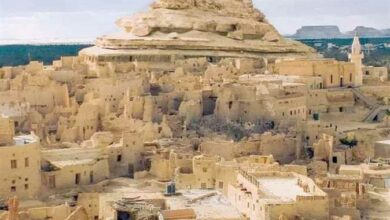The once tranquil rural village of Gurna now looks like a reflection of Luxor City. Only two years ago, streets were not paved and the scenery looked very different. Now roads are busy with cars and trucks, and a forest of buildings surpasses the tallest palm trees.
Most of the nicest hotels in Gurna don’t have a view anymore. The noise of construction site machines wakes you up in the morning instead of tweeting birds. At this pace, urbanization will soon reach the Hatshepsut temple, as it has with the neighborhood at the footsteps of the Giza Plateau.
Hamada, manager of one of the oldest family hotels in Gurna, expresses his worry about the situation in the village and the community.
“They all just started building and building. They think that [tourists] will come back. But I wonder when. We are surviving only because our business is 30 years old, but currently we are only earning enough to maintain the 15-person staff. We used to have bookings one year ahead. All canceled,” he says.
—
At the edge of the urbanized area, where the tract of green fields starts, stands a very poor house, with a courtyard surrounded by a shallow, mudbrick wall. At the corner lies a traditional circular oven. The smell of freshly baked bread leavened in the early morning sun fills the place.
A woman invites me to have a look inside. Bilal, the youngest of the woman’s five children, was born on 25 January last year, the day Egyptians erupted against decades of political oppression.
“Five is enough,” says Aysha, 37. “My oldest son used to go to school, but we needed him to contribute to helping the family. Now he is working as an assistant at a racetrack. There is work for him in this business.”
She says he was very upset at having to give up studying, but the family couldn’t even afford to buy him new shoes.
“You cannot go to school in your slippers. You need to look decent. We are ready to sell the land. We can do a Nubian village if you like. That’s the trend,” she says bitterly.
The family is originally Nubian, but they ended up living in the mudbrick house without rooftops after being evicted from their village of origin. They never wanted to relocate to New Gurna, an uncomfortable, desert-locked compound far from economic activity and where basic services are out of reach.
Aysha is convinced that the revolution will succeed and things will change for the better.
“After all,” she says, “all those politicians in the country were corrupt. We needed to get rid of them.”
—
The wild urban development made competitiveness, tension and social envy much more evident in the area.
“Now everybody here has a gun or a rifle or both,” says Emad, an 18-year-old tourism worker. “The village is very safe, even safer than before the revolution. We all take care of each other as we know all the families, and we protect houses and properties. But it has become very dangerous to travel by car just outside town. We don’t even dare stop to help another vehicle in trouble because there have been too many robberies, kidnappings and even murders happening.”
—
Emad and his friend Ibrahim are cautiously hopeful about the situation in Gurna and Luxor after the revolution. They took advantage of the absence of police control to arrange an ahwa in the narrow alley between the bus station and a football field.
They removed the metal fences, installed a wooden cupboard with metal locks, set up an electric stove rudimentarily connected to public electricity, and used old election posters to make some shade. The result is quite impressive: a comfortable, cool and strategically positioned ahwa that is always full.
“The police came once to say that it was illegal and they wanted to close it, but our whole family and friends came by and prevented them. They didn’t come back,” Ibrahim says.
The pair has put a lot of effort in the enterprise, cleaning the space of accumulated trash and excavating the soil to level it to the sidewalk.
“We want to make it better, plant flowers and decorate it, but we don’t know if it’s worth it. They could close it down anytime if the situation changes,” Ibrahim says.
—
The population of Gurna also has American and European scholars and archaeologists working on their state sponsored excavations. Old British ladies befriend the elders of the village, who are often amused by their lifestyles.
A 32-year-old mother has opened a beauty salon. Since Gurna started developing into a city, her business has taken off. “I do European-style hair since I studied as a cosmetician in England for two years,” she says. “A lot of tourists come to me now instead of going to the big hotels. But no Arabs [from Saudi Arabia and the Gulf] come to Luxor. They don’t like history and culture. They only like to have fun.”
This piece was originally published in Egypt Independent’s weekly print edition.




